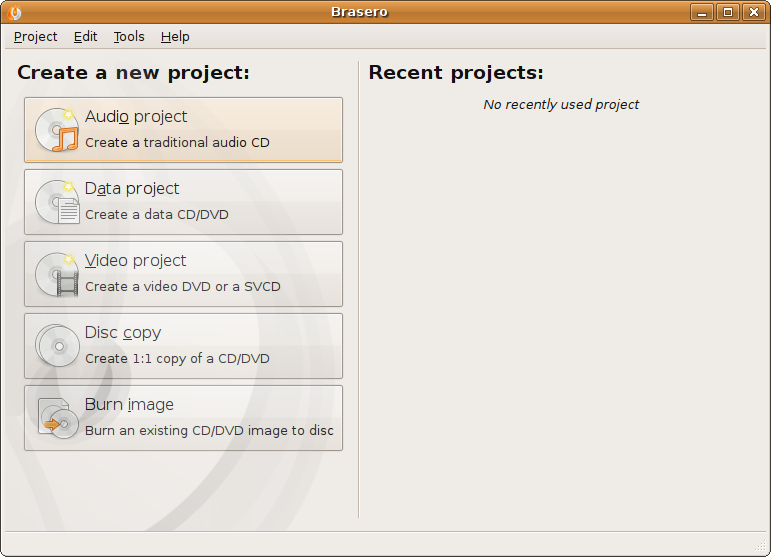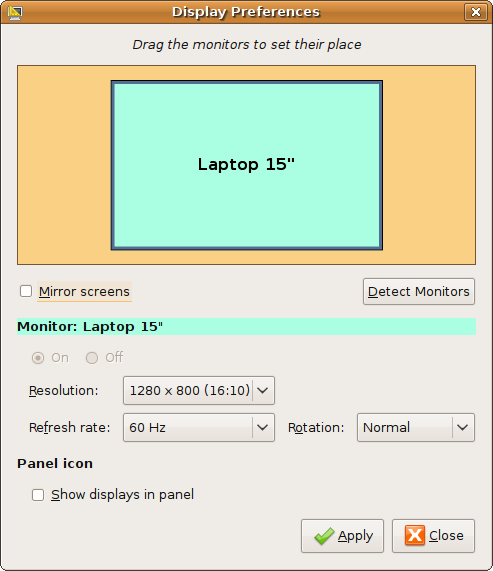
 Ubuntu 9.04 Beta includes the latest GNOME 2.26 desktop environment with a number of great new features, including:
Ubuntu 9.04 Beta includes the latest GNOME 2.26 desktop environment with a number of great new features, including: brasero, developed by Philippe Rouquier and Luis Medinas, as an all-in-one CD burning application.

Improved handling of multiple monitors with an updated gnome-display-properties by Federico Mena Quintero.

X.Org server 1.6
The latest X.Org server, version 1.6, is available in Jaunty. A number of video cards have been transitioned to free drivers as part of this update.
The -ati driver has received numerous fixes and performance improvements. It now uses the EXA acceleration method by default. 2D acceleration support for the newest R6xx/R7xx family of cards is also available. 3D support is available up to R5xx cards for -ati. An updated -fglrx proprietary driver is available for R6xx/R7xx users who need 3D support.
New style for notifications and notification preferences
Included in Jaunty is a simple menu which can be used to set preferences for notification icons, such as where they pop up on the taskbar. Ubuntu 9.04 beta also includes a whole new notification system, as shown in the Flash movie here:
Boot performance
A number of improvements to the Ubuntu start-up process bring significantly improved boot performance to Ubuntu 9.04 Beta. Please open bugs if you experience any degradation, and tag them with boot-performance.
Linux kernel 2.6.28
Ubuntu 9.04 Beta includes the 2.6.28-11.37 kernel based on 2.6.28.8.
Ext4 filesystem support
Ubuntu 9.04 Beta supports the option of installing the new ext4 file system. ext3 will remain the default filesystem for Jaunty, and we will consider ext4 as the default for the next release based on user feedback. There has been extensive discussion about the reliability of applications running on ext4 in the face of sudden system outages. Applications that use the conventional approach of writing data to a temporary file and renaming it to its final location will have their reliability expectations met in Ubuntu 9.04 beta; further discussion is ongoing in the kernel community.
Ext4 support in GRUB was provided by Colin King. If you choose to upgrade your / or /boot filesystem in place from ext2 or ext3 to ext4 (as documented on the ext4 wiki), then you must also use the grub-install command after upgrading to Ubuntu 9.04 Beta to reinstall your boot loader. If you do not do this, then the version of GRUB installed in your boot sector will not be able to read the kernel from the ext4 filesystem and your system will fail to boot.
Ext4 support in gparted has been provided by Curtis Gedak.
Cloud computing
Ubuntu 9.04 Server Edition makes it easy to experiment with cloud computing. Eucalyptus, an open source technology which is included in Ubuntu as a technology preview, enables you to use your own servers to deploy, experiment and test your own private cloud that matches the Amazon EC2 API. You can dynamically create virtual machines, configure multiple clusters into a single Cloud and even provide an EBS (elastic block storage) equivalent and an S3 compatible storage manager.
Turn-key mail servers
The dovecot-postfix package in Ubuntu 9.04 Beta provides an easy-to-deploy mail server stack, with support for SMTP, POP3, and IMAP with TLS and SASL.
dovecot-postfix was packaged by Ante Karamatić.
Testing wanted
There are a number of specific areas of focus in Ubuntu 9.04 where the developers could use from more feedback from users. Read on to find ways that you can use the beta to help to improve the Ubuntu 9.04 final release.
Suspend/resume testing
The Ubuntu kernel team has been gathering information about what laptops do and don't suspend and resume correctly. If you are running Ubuntu on a laptop and would like to participate to help make sure the kernel team has accurate information about Ubuntu's support for your hardware, please see KernelTeam/SuspendResumeTesting.
Hotkey testing
Hotkey handling has been a source of difficulty in the past two Ubuntu releases. Significant improvement has been made to the range of hotkeys supported in Ubuntu 9.04, but more user feedback is still needed, to help identify those hotkeys that are not yet supported. If you have a keyboard with a hotkey that doesn't function as you expect, please see Hotkeys/Troubleshooting for directions on reporting this problem in the right place.
Kerneloops
With the Ubuntu 9.04 Beta release, we invite you to install and test the kerneloops package. kerneloops is a daemon that collects kernel crash information and then submits the extracted signature to the kerneloops.org website for statistical analysis and presentation to the Linux kernel developers. Additionally, a bug report regarding the crash in question will be filed within Launchpad for tracking purposes.
Known issues
As is to be expected at this stage of the release process, there are several known bugs that users are likely to run into with Ubuntu 9.04 Beta. We have documented them here for your convenience along with any known workarounds, so that you don't need to spend time reporting these bugs again:
A bug in an Ubuntu-specific patch to X server logging code will cause X sessions to crash after they have been running for longer than a day. Users encountering this bug should upgrade to the latest version of the xserver-xorg-core package, which will be available immediately after the beta release. 328035.
Some users of Intel i8x5 video chipsets are unable to load X, getting an error message of "Fatal server error: Couldn't bind memory for BO front buffer". As a workaround, use the VESA driver by logging into a text console, running "sudo nano /etc/X11/xorg.conf", and adding the line Driver "vesa" to the Device section. An alternative (experimental) workaround is to use the UXA acceleration method (see below). If in doubt, please do not upgrade to Ubuntu 9.04 Beta yet. 304871
Users of Intel video chipsets have reported performance regressions in Ubuntu 8.10 compared with previous releases. (252094) Although these performance issues have not been resolved by default in Ubuntu 9.04, a new experimental acceleration architecture option, DRI2/UXA, is available for Intel graphics users. Our testing has found this provides significant performance improvements for many users, but has also shown risk of severe stability problems, thus we are not yet providing to the general public. You can opt-in to enable this by running "sudo gedit /etc/X11/xorg.conf", and adding Option "AccelMethod" "UXA" to the Device section of your xorg.conf. Users wishing to maximize stability should stay with the standard default acceleration method, "EXA".
Ctrl-Alt-Backspace is now disabled, to reduce issues experienced by users who accidentally trigger the key combo. Users who do want this function can enable it in their xorg.conf, or via the command dontzap --disable.
Ubuntu 8.10 systems installed from the desktop CD mistakenly had the lilo package installed as well as grub, although grub was used for booting. If you use the recommended Update Manager upgrade method, then the lilo package will be removed if it does not appear to be used. If you upgrade using some other method and are sure that you only use the GRUB boot loader, then we recommend that you remove the lilo package manually. 314004
On the timezone map in the desktop CD installer, the markers for cities are displaced from their correct locations. Users should be aware of this issue when selecting their timezone. This bug will be resolved for daily builds immediately after the 9.04 Beta. 334284
If any filesystems are mounted when starting the desktop CD installer, then a dialog labelled "Unmount partitions that are in use?" will be presented. Unfortunately, the buttons on this dialog box are poorly named: "Continue" attempts to unmount filesystems and then repeats, which will often just display the same dialog box again, while "Go Back" ignores this condition and continues. This will be corrected for the final release. 346589
On desktop installations from USB disks, such as typical Ubuntu Netbook Remix installations, the installer displays a warning about the fact that the installation medium itself (often /dev/sdb) is mounted. This warning is unnecessary, because the fact that it is mounted is completely normal, and does not interfere with the user's ability to install the system to devices other than the USB disk itself. You should ignore this warning; note that in order to do so you will need to select "Go Back", due to the issue above. 347916
In some cases, the "Prepare Disk Space" screen in the desktop installer displays obviously incorrect partition sizes in its graphical disk previews. This is only an error in the preview and does not reflect a problem with the partitioning changes that will actually be applied. 336203
The mythtv frontend in mythbuntu fails to render fonts correctly when using video drivers other than the Intel or closed-source nVidia drivers. This issue is expected to be resolved for the final 9.04 release. 341898
When installing to a system with another OS previously installed, the migration assistant will offer to migrate settings and documents even when the entire disk is being overwritten. The migration assistant will not be able to preserve documents when using the entire disk for installation. 339898
Users who were running eCryptfs on the Jaunty Alpha milestones are advised to re-encrypt any encrypted files. An upstream 2.6.28 kernel bug caused random kernel memory to be written to eCryptfs encrypted file headers. The fix has been applied and deployed to Ubuntu users in the Jaunty Beta kernel. Ubuntu eCryptfs users running this kernel should re-encrypt each encrypted file using /usr/bin/ecryptfs-rewrite-file. For more information, please see ecryptfs-rewrite-file(1). See 345544.
Users of Compaq Smart Array controllers will be unable to remove existing LVM volumes using the partitioner in the installer. 341928
The mdadm package in Ubuntu 9.04 Beta will fail to assemble RAID10 arrays on boot. Other types of RAID are not affected; investigation of this issue is ongoing. 316670
Booting degraded RAID may fail in virtual-machine setups where the host is running with cpu frequency scaling enabled, due to a non-deterministic race condition, 334994. Booting degraded RAID on physical hardware should not be affected, since the cpu frequency is constant through the hard disk detection process.
- Upgrading a desktop system using an ATI video chipset with the fglrx binary-only driver may result in a warning that the driver needs to be replaced. There is a bug in the driver replacement logic, so if you see this prompt, please cancel the upgrade until this is fixed, which will happen immediately after the beta release.
It should come as no surprise that this beta release of Jaunty Jackalope contains other bugs. Your comments, bug reports, patches and suggestions will help fix bugs and improve future releases. Please report bugs using the tools provided.
If you want to help out with bugs, the Bug Squad is always looking for help.









0 comments:
Post a Comment